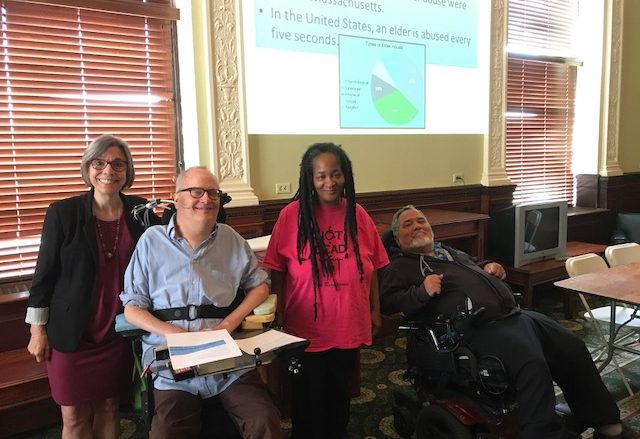Assisted Suicide Bill Would Show Disabled the Door, Opponents Say
By Lori Brannigan Kelly | September 25, 2017, 7:58 EDT
 Massachusetts state Representative Denise Provost (D-Somerville), left, stands with (from left to right) John Kelly, director of Second Thoughts Massachusetts; Anita Cameron, director of Minority Outreach – Not Dead Yet; and Somerville resident Brian Shea. ////
Photo by Lori Brannigan Kelly for New Boston Post.
Massachusetts state Representative Denise Provost (D-Somerville), left, stands with (from left to right) John Kelly, director of Second Thoughts Massachusetts; Anita Cameron, director of Minority Outreach – Not Dead Yet; and Somerville resident Brian Shea. ////
Photo by Lori Brannigan Kelly for New Boston Post. Legalizing assisted suicide in Massachusetts would put pressure on the poor and the disabled to die, opponents say.
The Massachusetts Legislature is considering a measure that would allow physician-assisted suicide, but skeptics held a briefing last week foreseeing sad consequences if it passes.
“It is a widespread human desire to experience a peaceful, relatively pain-free death. But I think it would be a mistake to make physician-assisted suicide legal, especially as Americans’ access to health care is under threat of repeal,” said state Representative Denise Provost (D-Somerville). “People with disabilities, those who are poor or otherwise marginalized, could easily be pushed to choose premature death as their options narrow.”
Thursday’s briefing at the House Members Lounge at the State House underscored the possibility that the severely disabled, the autistic, the mentally ill, the poor, the elderly, minorities, and uninsured populations – all those who suffer both stigma and much higher rates of abuse than the general public — could become targets in a culture that legalizes euthanasia.
One hearing attendee, Tom Wood of Salem, New Hampshire, insisted that euthanasia in no way equates with compassion.
“It is not mercy. It’s out and out premeditated murder,” said Woods, who is a member of Spectrum Boston and Mass ADAPT, both of which advocate for the disabled.
The briefing was sponsored by Second Thoughts Massachusetts, a disabled-rights organization that is opposing assisted suicide.
This past January, state Representative Louis Kafka (D-Stoughton) filed the assisted-suicide bill (House 1194), which has 44 co-sponsors. Senate 1225, filed by state Senator Barbara L’Italien (D-Andover) and with 11 co-sponsors, is the state Senate’s version.
John Kelly, director of Second Thoughts Massachusetts, which warns against a growing “better dead than disabled” mindset in the United States, said assisted suicide is a disability rights issue that threatens everyone.
“Because of misdiagnosis, abuse, insurers’ bottom line, suicidal despair, people’s guilt and coercion and abuse, these kinds of bills are very dangerous for everyone in the state. Innocent people will lose their lives if these bills become law,” Kelly said.
One briefing attendee, Brian Shea of Somerville, suggested that targeting certain people is the inevitable outcome of the proposed new law: “It is the use of the state to manage a section of the population who are poorer, who are marginalized, and who are a lot of people of color.”
In response to the concerns raised during the hearing, the Massachusetts chapter of Compassion & Choices issued a press release.
“This legislation contains a number of safeguards to protect terminally ill patients based on 40 years of combined state experience with medial aid in dying,” said Marie Manis, Massachusetts campaign manager for Compassion & Choices, in the written statement. “In the six states (Oregon, Washington, Montana, Vermont, California and Colorado) that have authorized this option, there has never been a single case of abuse or coercion.”
Together with other End of Life Options Act proponents, Compassion & Care says that the law states a person cannot qualify for medical aid in dying simply because the person has a disability.
But opponents of the measure find no comfort in that assurance. Even if safeguards exist for terminally ill individuals, they argue, disabled patients represent a vulnerable demographic that could, in the future, be targeted both by a contracting health care system and by insurance companies worried about controlling costs and unwilling to pay for expensive care.
Earlier this month the American College of Physicians issued a policy statement against the legalization of assisted suicide. “This practice is problematic given the nature of the patient-physician relationship, affects trust in that relationship as well as in the profession, and fundamentally alters the medical profession’s role in society,” the organization’s position paper states.
The Washington Times reported this past May that insurance companies in states where physician-assisted suicide is legal have refused to cover expensive, life-saving treatments for patients, but have offered to help them end their lives instead.
Drugs for assisted suicide cost about $75 to $100, making them far less expensive than providing medical care.
Anita Cameron, director of minority outreach for Not Dead Yet, which oposes the measure, insists that economic pressure will help normalize euthanasia, and that in that environment the potential for abuse to the disabled community would be real.
“It is cheaper to kill us than to have us live,” says Cameron.
The 2017-2018 session is the eighth time a so-called “death with dignity bill” is under consideration in the Massachusetts legislature. Additionally, in 2012, the issue came before voters in the form of a ballot question. Voters rejected the measure 51 to 49 percent.
This year, however, support for assisted suicide appears to be growing in the Massachusetts legislature. The current 45 sponsors in the House of Representatives is up from 39 in the last session.
The next hearing for the House and Senate assisted suicide bills is scheduled for Tuesday, September 26 in the Joint Committee on Public Health.
If the legislature approves the bill, it will go on to Governor Charlie Baker for signature.
As of Monday morning, the governor’s office had not provided comment.











